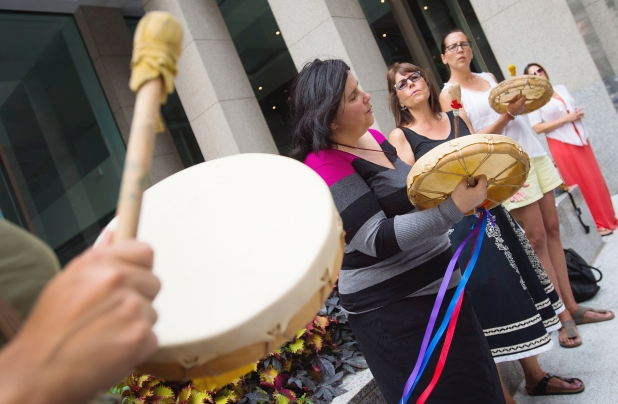Imperial Metals in First Nations crosshairs over tailings dam collapse
Wednesday, August 13, 2014
VANCOUVER SUN

Imperial Metals is facing pressure from First Nations to halt its other projects in the aftermath of the Mount Polley mine collapse in central B.C. last week.
The Neskonlith are set to issue a hand-delivered eviction notice to the company Thursday over the development of the Ruddock Creek zinc and lead mine on their traditional territory in the Thompson-Okanagan.
And some members of the Tahltan Nation in northwestern B.C. have called for a halt to construction at Imperial’s $500-million Red Chris copper and gold mine. The members of the Tahltan, which include elder’s group the Klabona Keepers, want an independent review of the tailings pond and dam. They say they have been blockading a road into the mine site, but it is not clear what effect that has had on construction.
On Wednesday, following a visit with the Tahltan, B.C. Mines Minister Bill Bennett said the Red Chris mine won’t start operating until the Tahltan have been given a chance to review an independent study of the tailings facility and dam. He noted the Tahltan and Imperial Metals are continuing to discuss the review, where the First Nation would choose the engineering firm and the company would pay.
The pressure tactics have increasingly been taken up by First Nations emboldened by court decisions that support their case for land rights. Last month, the Gitxsan in northwest B.C. issued an eviction notice to CN, forest companies and sport fishermen in their traditional territory. They only suspended the eviction notice after they said the B.C. government agreed to amend an agreement-in-principle that had signed away lands claimed by the Gitxsan to the Kitselas and Kitsumkalum bands.
The six-member Yinka Dene Alliance in north-central B.C. has also issued a blanket no-trespassing warning to Enbridge over its opposition to the company’s $7.5-billion Northern Gateway oil pipeline.
Neskonlith chief Judy Wilson said the First Nation issued a declaration of opposition several years ago to the Ruddock mine because it was in a “sacred headwater,” but acknowledged that it has had little effect on stopping or slowing down Imperial Metals’ work.
The Ruddock mine is in the pre-application stage of its environmental assessment.
Wilson said the Mount Polley tailings dam collapse has confirmed their worst fears, and they plan to step up their efforts to stop the project.
“We will be sending the (eviction notice) to their financiers and their insurers because those companies need to know the risks, and they need to know they are in these areas without our consent and that we have a lot of concern,” said Wilson.
The Neskonlith have not chosen to launch a legal challenge, in part because it’s lengthy and costly, said Wilson.
A recent landmark Supreme Court of Canada ruling granted title to a large tract of land in central B.C. to the Tsilhqot’in, which also means that consent is needed from the First Nation for resource development except where there is an overriding, significant public interest.
High-court decisions have also determined First Nations have a right to be consulted and accommodated where there are effects from resource development.
But where First Nations have not proven title to their land, they do not have a right to evict companies, said Sam Adkins, a lawyer with McCarthy Tetrault in Vancouver.
“There are real legal rights (for First Nations) but in the absence of proving aboriginal title, consent is not required under Canadian law,” said Adkins, a specialist in aboriginal law who represents resource companies.
He said the eviction notices from First Nations are “largely political manoeuvres.”
Adkins said resource companies want to work with First Nations to resolve environmental and cultural concerns and work out benefits agreements.
“But if you can’t work together, you have to look to what your legal rights are and look to enforce them as well, because ultimately you need to balance these issues,” he said, pointing to CN’s move to get an injunction blocking the Gitxsan’s eviction notice.
University of B.C. law professor Elizabeth Edinger said even though title has to be established for First Nations to be able to require consent for resource development, they may nevertheless be relying on the Tsilhqot’in decision in issuing the eviction notices.
The First Nations issuing eviction notices probably has as much of a “leg to stand on” as B.C. Premier Christy Clark saying no to Northern Gateway, said Edinger.
She noted while B.C. doesn’t have a constitutional basis to stop the oil pipeline project, they can certainly negotiate. “So, it may be the same negotiating tactic (for First Nations),” said Edinger.
Imperial Metals and Tahltan representatives could not be reached for comment Wednesday afternoon.
The Tahltan office said that community representatives were meeting with Mines Minister Bill Bennett and Imperial Metals president Brian Kynoch.
Photo: Members of the Secwepemc Women Warrior Society sing and beat drums while protesting against Imperial Metals outside of the Toronto Stock Exchange in Toronto’s financial district on Thursday, Aug. 7.


